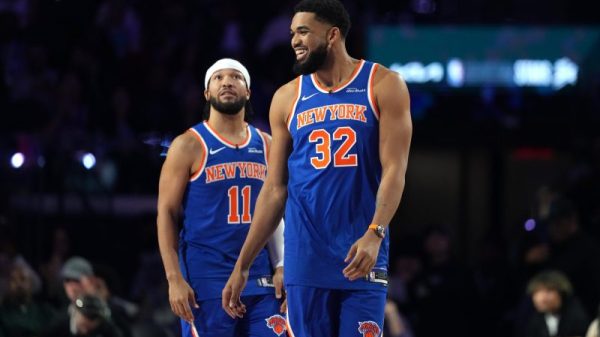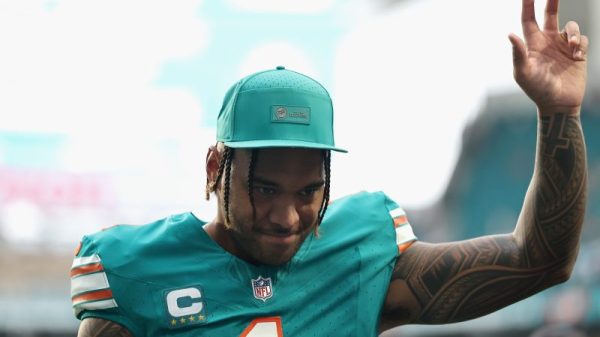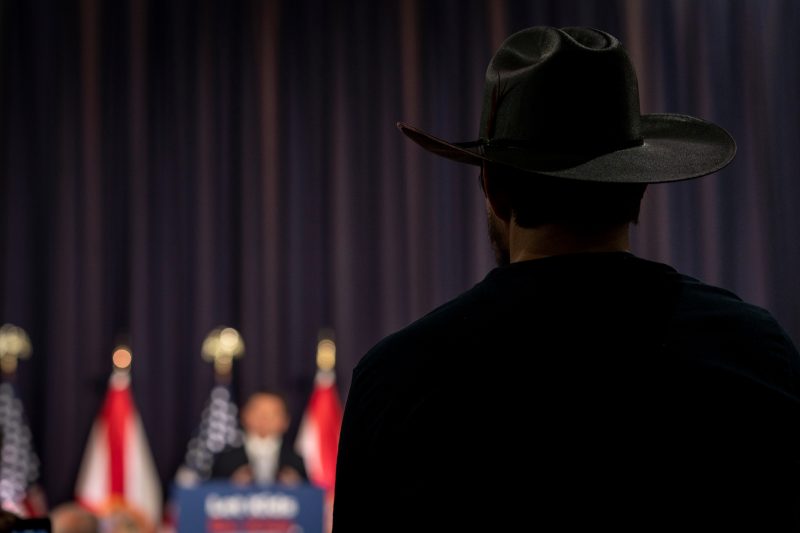Say what you will about Donald Trump and his continued domination of the Republican Party; his candidacy apparently isn’t scaring away ambitious Republicans.
The past week built toward a GOP primary field that might be 10 or so candidates deep. Sen. Tim Scott (S.C.) and Florida Gov. Ron DeSantis officially entered the race. Former vice president Mike Pence and North Dakota Gov. Doug Burgum signaled that they are preparing campaigns. And, last week, New Hampshire Gov. Chris Sununu placed the odds of his running at a weirdly specific number: 61 percent.
We should probably understand this as having more to do with DeSantis than with Trump. The lane for the Trump alternative appears more open than it was, because DeSantis has lost some ground. And that is crucial, because the name of the game is trying to win the nomination as that Trump alternative before trying to win the actual nomination.
Whether that is a realistic strategy is another question.
After the 2022 election, some polls had DeSantis doing much better in a head-to-head matchup than in a crowded field. The obvious conclusion: If the race were ultimately whittled down to more or less a head-to-head, he’d have a shot.
It’s not clear that’s still the case. A recent Marquette Law School poll showed Trump’s 21-point edge in a crowded field shrinking to four points in a head-to-head with DeSantis, but a Quinnipiac poll showed something quite different: Trump leading by about 30 points in a crowded field and in a head-to-head. These are just the polls that tested both setups, but most other head-to-head polls show Trump with sizable leads.
We saw in 2016 how this whittle-down theory can make sense in theory but not in practice. And as that year also showed, the danger for the would-be alternative is that nobody wants to make way for someone else to test the theory.
Below is our recurring list of the 10 candidates most likely to produce the next GOP presidential nominee. They are ranked in order of likelihood to be nominated, with No. 1 being most likely.
The political neophyte and “anti-woke” activist registered 4 percent in the most recent Fox News poll, tied with Nikki Haley and just a point behind Pence. It’s tough to see how he’ll have even a Herman Cain-esque boomlet in a race with Trump, but don’t be surprised if he at some point reaches up into the higher single digits and makes himself a presence. (Previous ranking: 10)
Here comes a late surprise. The North Dakota governor has signaled over the past week or so that he’s likely to throw his hat into the ring, and The Washington Post has confirmed that he plans to announce on June 7. He is little known on the national stage, but he’s a business-minded and pragmatic conservative who apparently would try to parlay his Midwestern style into a strong showing in Iowa. He is also wealthy, having once sold a software business to Microsoft for $1.1 billion. (Previous ranking: n/a)
The former New Jersey governor gets this slot because it sure looks as if he’ll run (perhaps more likely than the next two names on this list). He has spent the past couple of months basically delivering the kind of case against Trump that some Never Trumpers wanted to see from Liz Cheney. That could be significant, especially if he can make the debate stage. But 7 in 10 Republicans say they won’t consider Christie, and polls generally show more Republicans dislike him than like him. (Previous ranking: n/a)
The New Hampshire governor would stand little chance if he ran, although we’d certainly put him ahead of other Trump critics including Christie, Cheney and Asa Hutchinson. That’s because he’s a popular incumbent governor. Also: the New Hampshire factor. Usually, you wouldn’t get much credit for winning or doing well in your home state, but when you come in being given little chance in the first place, a good showing there could provide some momentum. For now, Sununu appears to be running in third place in New Hampshire. (Previous ranking: 8)
The Virginia governor said early this month that he’s not running for president “this year.” Since then, the signs are that a run is very much still on the table. But if he does leap, an announcement apparently could wait until November, after state legislative elections. The Iowa caucuses are likely to be just two months later, so this would be a historically late entry, and he apparently would have to file for certain states’ primaries before being an actual candidate. That feels a lot like a guy who wants to see how things shake out and whether he can ride in as a late savior for the establishment wing if DeSantis falters, or wants to stay a part of the conversation for something later. (Previous ranking: 6)
You could be forgiven if you completely missed the campaign launch this week by the senator from South Carolina. He seems to be playing the long game, carving out a lane as the most broadly acceptable candidate if the others destroy one another. He has got a compelling personal story and is good at playing the role of happy warrior for conservative causes. But he might be tempted to aim at something besides the very top of the ticket. (Previous ranking: 3)
The former South Carolina governor and U.S. ambassador to the United Nations goes above Scott because she’s actually shown a willingness to mix it up on the campaign trail. It’s mostly been about going at Ron DeSantis — she knocked him this week for basically emulating Trump, even in his mannerisms — but what you’re likely to see is plenty of tussling over who gets to be the Trump alternative. And Haley seems at least to be trying out messages that could put her on people’s radars. (Previous ranking: 5)
This is the hardest spot to pick. Who among the many candidates in the mid- to low single digits appears to have the best shot? We’re going with Pence for now, in large part because Scott and Haley haven’t shown us much. Pence would start the campaign in historically bad shape, especially for a former vice president, with 4 in 10 Republicans disliking him and 57 percent saying they wouldn’t consider voting for him. But if we’re straining, we can see an argument for the GOP de-prioritizing overturning the 2020 election, DeSantis flaming out, and the base seeing in Pence someone who is mostly aligned with Trump and whom it used to like quite a bit pre-Jan. 6. (Previous ranking: 4)
The Florida governor enters the race at a clear low point — his deficit has more than doubled since March, to 30-plus points — and his launch on Wednesday didn’t exactly go swimmingly. We don’t want to read too much into it, but that was not really what he needed at a time when donors and other would-be supporters might be becoming jittery about running afoul of Trump — something that often comes with a steep cost and is avoided accordingly. (Previous ranking: 2)
The next big thing to watch for — beyond how he contends with the newly announced DeSantis — is how the former president’s legal jeopardy pans out this summer. Special counsel Jack Smith’s classified documents probe may be nearing its end. District Attorney Fani Willis of Fulton County, Ga., has set aside time in August for what might be an announcement of a grand jury indictment of Trump. We shouldn’t assume that an additional indictment will hurt Trump, given how Republicans responded to his indictment in Manhattan and to a civil verdict against him in the E. Jean Carroll case. But the Georgia and federal cases involve more serious conduct than the Manhattan one and are criminal matters, unlike the Carroll case. And if Trump is looking like a liability in the general election, perhaps DeSantis’s electability argument, which has been neutralized, will regain some force. (Previous ranking: 1)
Others worth mentioning: Former Arkansas governor Asa Hutchinson, South Dakota governor Kristi L. Noem, former White House national security adviser John Bolton, former Wyoming congresswoman Liz Cheney, Texas governor Greg Abbott, former Texas congressman Will Hurd, former California gubernatorial candidate Larry Elder and Miami mayor Francis Suarez.



























